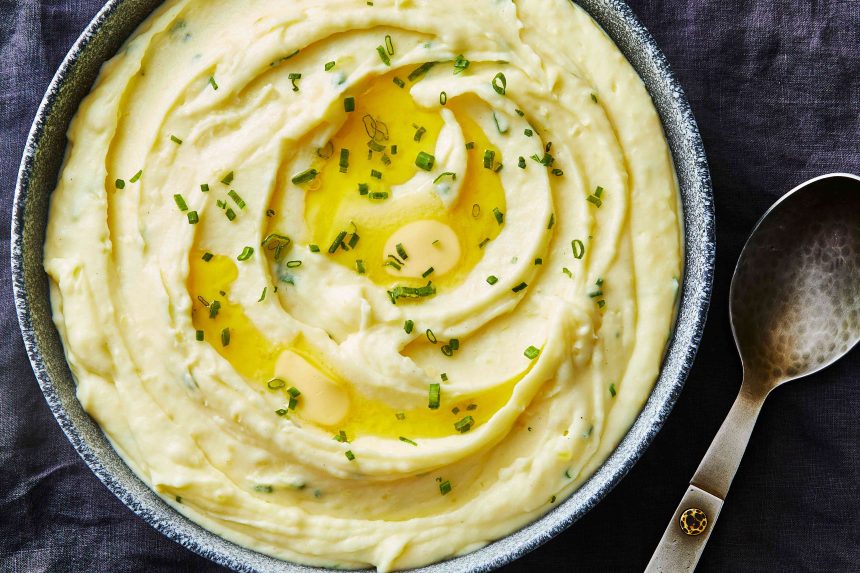Salt is an essential part of any great dish, but when it comes to mashed potatoes, when you add salt can make a big difference in the end result. Whether you’re whipping up a holiday spread or preparing a hearty weeknight meal, knowing when to salt your potatoes can take your dish from good to great. Should you salt the water when boiling the potatoes, add it while mashing, or finish with a sprinkle on top?
While these all sound like great options, let’s dive into the strategy behind when exactly to salt your mashed potatoes for the most irresistible results.
Caitlin Bensel; Food Stylist: Torie Cox
Why Timing Matters When Salting Mashed Potatoes
Understanding when and how to salt your mashed potatoes can help you achieve the perfect balance of flavor, texture, and consistency. There are a few reasons why timing matters when salting mashed potatoes:
- Salt absorption: Potatoes absorb salt at different stages of the cooking process in different ways. By salting a pot of water before adding the potatoes, they begin to absorb the salt as soon as they start cooking, leaving them evenly seasoned throughout. If salt is added later on, whether during or after boiling, there’s less time for the potatoes to absorb the flavor fully.
- Flavor distribution: Adding the salt too late during the boiling process can lead to unevenly seasoned potatoes. Similarly, salting while mashing can lead to uneven results, as some areas might remain overly salty and others unseasoned—particularly if you’re trying to avoid overworking your potatoes.
- Texture impact: Salting at different stages can affect the texture of your mashed potatoes. While salting before boiling helps enhance the overall moisture of the potatoes, salting while mashing can draw out that moisture, leading to a slightly drier or grainier texture. Salt can also help emulsify fats like butter and cream into the potatoes when added early.
Emily Laurae
When To Salt Mashed Potatoes
So when is it really the best time to salt your mashed potatoes? Let’s talk timing:
- Salt the water: We know that starting potatoes in cold water is key to the most even cooking, and the same is true for salting: it’s best to salt your water before adding in the potatoes to ensure they absorb the seasoning from the moment they enter the pot. This helps create the most evenly seasoned results, from the center of the potato outward.
- Season the mash: Since your potatoes have already been seasoned during boiling, tasting and adjusting is all that should be needed during the mashing process. If you’ve added butter, cream, or other elements, a quick sprinkle of additional salt might be needed for that perfectly balanced flavor.
- Garnish: Serving mashed potatoes with a little extra melted butter drizzled over the top can really take them over the top. The same is true of finishing the dish with a sprinkle of flaky sea salt (or kosher salt). That little extra salty crunch on top can be the perfect final touch.
Best Practices When Salting Mashed Potatoes
It’s not just when you add the salt that matters:
- Amount of salt: The right amount of salt can make all the difference, and typically, you’ll want to use one to two tablespoons of salt per quart of water (or about one tablespoon per pound of potatoes) during the boiling process. After mashing, taste and adjust as needed. Remember, you can always add more, but it’s harder to balance an overly salty dish after the fact.
- Even seasoning: To make sure your salt is evenly distributed, opt for a fine salt if adding after mashing to make sure it dissolves easily into the potatoes.
- Alternative seasonings: While salt is the ultimate flavor enhancer, don’t sleep on the other methods of adding depth and flavor to your mashed potatoes. Butter and cream cheese add richness, and can help mellow out overly salty potatoes if needed. Roasted or sautéed garlic can add a savory depth, fresh or dried herbs can add complexity, freshness, and pops of color, grated cheese can add an indulgent finish, and crumbled bacon can add a salty kick and textural contrast. If adding these other items, make sure to wait on adding additional salt until you’ve tasted the final dish.
Remember, it’s never too late to add an extra sprinkle of salt if needed, but it’s best to start early in the process for best results.







